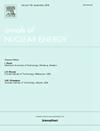连续能蒙特卡罗计算中的核数据不确定性传播
IF 1.9
3区 工程技术
Q1 NUCLEAR SCIENCE & TECHNOLOGY
引用次数: 0
摘要
XSUSA 方法是一种成熟的随机取样方法,用于通过多组中子输运计算传播核数据的不确定性。为了受益于蒙特卡罗输运代码的优势,即复杂几何建模和使用连续能核数据,提出了 XSUSA 的扩展,允许使用多组核数据协方差扰动连续能核数据。为了验证这一扩展,通过直接扰动计算了 Jezebel、Godiva 和 LEU-SOL-THERM-002 等基准问题的核反应灵敏度曲线。灵敏度曲线与 TSUNAMI 和 Serpent 的灵敏度曲线非常吻合。其次,对 XSUSA 的扩展应用于使用 SCALE 6.2 的协方差库生成随机抽样的连续能数据 库。利用这些数据 库,对 Jezebel、Godiva、LEU-SOL-THERM-002 和 OECD/NEA LWR-UAM 基准的 TMI-1 针单元进行了 Serpent 计算采样。对于每个问题,乘法因子的不确定性都与 TSUNAMI 的不确定性非常吻合。本文章由计算机程序翻译,如有差异,请以英文原文为准。
Nuclear data uncertainty propagation in continuous-energy Monte Carlo calculations
The XSUSA method is a well-established stochastic sampling method for propagating nuclear data uncertainties through multigroup neutron transport calculations. To benefit from the advantages of Monte Carlo transport codes, namely modeling complex geometries and using continuous-energy nuclear data, an extension to XSUSA is proposed which allows perturbing continuous-energy nuclear data using multigroup nuclear data covariances. To verify the extension, sensitivity profiles of nuclear reactions are calculated via direct perturbation for the benchmark problems Jezebel, Godiva, LEU-SOL-THERM-002. The sensitivity profiles agree well with those obtained from TSUNAMI and Serpent. Secondly, the extension to XSUSA is applied to produce randomly sampled continuous-energy data libraries using the covariance libraries of SCALE 6.2. With these data libraries, samples of Serpent calculations are performed for Jezebel, Godiva, LEU-SOL-THERM-002, and the TMI-1 pin cell of the OECD/NEA LWR-UAM benchmark. For each problem, the multiplication factor uncertainty agrees well with the one from TSUNAMI.
求助全文
通过发布文献求助,成功后即可免费获取论文全文。
去求助
来源期刊

Annals of Nuclear Energy
工程技术-核科学技术
CiteScore
4.30
自引率
21.10%
发文量
632
审稿时长
7.3 months
期刊介绍:
Annals of Nuclear Energy provides an international medium for the communication of original research, ideas and developments in all areas of the field of nuclear energy science and technology. Its scope embraces nuclear fuel reserves, fuel cycles and cost, materials, processing, system and component technology (fission only), design and optimization, direct conversion of nuclear energy sources, environmental control, reactor physics, heat transfer and fluid dynamics, structural analysis, fuel management, future developments, nuclear fuel and safety, nuclear aerosol, neutron physics, computer technology (both software and hardware), risk assessment, radioactive waste disposal and reactor thermal hydraulics. Papers submitted to Annals need to demonstrate a clear link to nuclear power generation/nuclear engineering. Papers which deal with pure nuclear physics, pure health physics, imaging, or attenuation and shielding properties of concretes and various geological materials are not within the scope of the journal. Also, papers that deal with policy or economics are not within the scope of the journal.
 求助内容:
求助内容: 应助结果提醒方式:
应助结果提醒方式:


